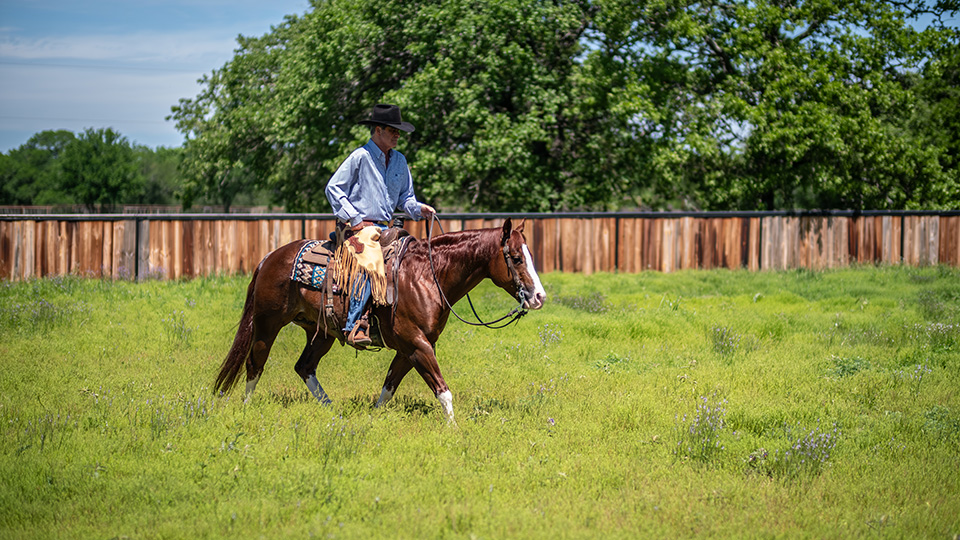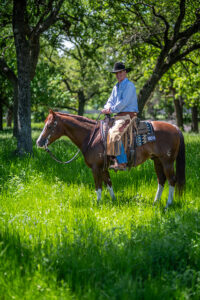
In 37th year of raising money for autism, Bobby Norris triples fundraising goal
By Scott Nishimura
Photography by Olaf Growald
It’s been 38 years since Bobby Norris’ daughter was diagnosed with autism, which set the Fort Worth Realtor down the path of raising money for the Autism Treatment Center, the nonprofit where the family sought treatment.
Now in its 37th year, Norris’ 501(c)3 nonprofit, Bobby Norris Roundup and its Roundup for Autism event, have raised a total of $5.8 million after expenses for the Autism Treatment Center, which has diagnostic and therapy centers in Dallas, San Antonio and Fort Worth, and single family and duplex homes in Dallas and San Antonio. The Autism Treatment Center confirms $3.88 million came through the roundup’s annual event, and another $2 million was influenced by the roundup.
This year, Norris — longtime rancher and farm and ranch Realtor — has brought fundraising consultants Susan Watt and Christie Eckler on board and moved the planned Sept. 21 event to the River Ranch venue in the Fort Worth Stockyards, more than quintupling potential capacity and significantly elevating visibility. Norris’ fundraising target: $1 million, triple last year’s gross.
“We want to break a million dollars every year,” he said. “I’d love to be able to sit here and tell you $5 million every year. We’ll work our way there.” Norris has converted the event, which for years paired a rodeo on one day with a gala on the next, to a gala-only for simplicity. Expect to continue to see loyal stars like Barry Corbin, Chuck Norris (no relation) and Sheree Wilson.

Bobby Norris, on his ranch in Aledo, has spent nearly four decades raising money for autism services.
360West: Tell us about how you got interested in autism.
Norris: My daughter was diagnosed 38 years ago with autism and I’d never heard of autism. It was just not that known. I went to several places, but nobody could seem to help me. The Child Study Center here in Fort Worth sent me to the Autism Treatment Center of Texas [in Dallas]. They did an analysis and confirmed that was pretty much, 80% sure that’s what it was.
360West: What was your daughter experiencing at the time?
Norris: She had trouble even standing up. She was 2. She quit trying to vocalize. In one day. She’d need to grab onto something to stand up. She was no longer picking up objects and playing with them like she used to.
360West: Can you tell us where she is on the spectrum?
Norris: She’s on the level of a second grader. She can never live alone or be self-sufficient. She’s really bright, as sweet as she can be. I just felt I had to do something about this. I felt helpless. The ABA [applied behavior analysis] therapy wasn’t as advanced as it is now. They can get out in front of it now. The best thing you can do is catch it early. The best thing I could do was raise money.
360West: Tell us about the first event.
Norris: I got [rodeo stars] Larry Mahan and Dean Smith and [country star] Lynn Anderson to come to my first. We had a little thing at my training center. We raised a whopping $7,500. I took the check and drove back over to Dallas and met Anna Hundley, who was and still is executive director. At that point, they were operating out of a church. They had two group homes then. Now we’re up to 32 group homes. A lot of fun stories and raised a lot of money. None of this could have happened through the years without the dedicated committee members. Over 35 years, they’ve stuck with you. We’ve got some who are still here today.
360West: Why do you think this has such the breadth of interest?
Norris: You wouldn’t believe the people who are drawn into this because they have an autistic child of their own, or they know someone who does. It’s so prevalent.
360West: The Fort Worth treatment center is now the primary beneficiary of your fundraising. What are its needs?
Norris: There’s two things I want to see happen with proceeds. One is to expand the Fort Worth center. The second is to create some residential programs here in Fort Worth. It’s time for Fort Worth to catch up. We have some [group homes] in Dallas, and San Antonio has some, too. We haven’t gotten into the group home situation in Fort Worth. That’s one of our big goals, is to initiate some group homes in Fort Worth. The need is overwhelming.
